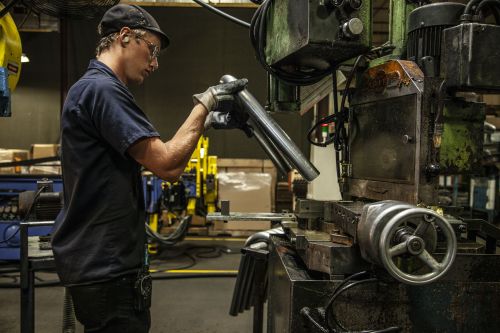FREEPORT, N.Y. (BRAIN) — Some of the bike products most in demand during the current mini bike boom — things like kickstands, indoor trainers, and car racks — happen to be available from domestic manufacturers. Companies with U.S. factories are ramping up quickly to meet demand while importers struggle with delays from their offshore suppliers.
"We're working as hard as we can, we are inundated with orders," said Peter Greenfield, owner of Greenfield Industries, which manufactures aluminum kickstands on Long Island.
Greenfield shut down its factory in April because of COVID-19 restrictions but re-opened in May. Since then, the company's roughly 40 workers are working overtime and Greenfield is contemplating adding a second shift.
Greenfield had slow 2019 sales and was expecting they would continue into 2020. So inventory was low before the pandemic. "I couldn't have anticipated this," he said.
Domestic manufacturers are challenged by distancing and hygiene requirements that reduce capacity and increase costs. In some cases they struggle with the availability of imported components and materials, as well. Greenfield doesn't use any foreign parts in its kickstands, but the company also makes cast aluminum electric junction boxes that rely on a part that is unavailable domestically, and production has slowed because of the lack of availability of that part from oversees.
But importers have more challenges: longer lead times, increased shipping costs, tariffs, and in some cases offshore factories that are still operating at less than full capacity.
In Madison, Wisconsin, Saris finds itself making products to supply two categories that are currently booming: car racks and indoor trainers.
Normally those categories are counter-seasonal so the company can focus its production on one at a time, said Chris Fortune, Saris' CEO. This year, not so much; Saris is operating assembly lines for both categories.
"Since things have opened up, the rack business is very strong. We are working at catching up. The team has done an amazing job turning the faucet on for trainers (production) and now for racks," Fortune said.
Saris has added more factory workers, who operate in three teams that work and break together to reduce the change of COVID-19 infections. Other workers are operating remotely.
Like other domestic manufacturers, Fortune said the availability of some imported components has handicapped its supply somewhat.
"Our suppliers have run dry in some cases. We have 1,000 trainers that are supposed to go out this week or early next week, but we're waiting for a (imported) power supply," he said.
Fortune said trainer sales were up 400% and he was confident that Saris was picking up market share from its competitors who import.
"That's the problem when you decide to import everything," he said.
At its factory in Kentucky, Wald Sports manufactures baskets, which retailers say are in great demand this year. The company did not immediately get back to BRAIN with questions about how the company is dealing with the increased demand.
At the high end of the market, Paul Components has resumed manufacturing at its California factory, said a spokesman, Travis California.
"It's been tough," he said. "When California announced 'Shelter in Place' we laid off everybody but three people, and just had one person in the office shipping orders with two people working from home.
"Sales have been up by 5-8%, and it's been a struggle to keep up. We have since divided our machine shop into zones in order to bring a few more people back, each zone being one employee's area, with their own bathroom and sink (yeah, we had to bring in porta-potties)."
Detroit Bikes is also continuing to expand capacity this year. The company recently got the order to manufacturer Schwinn's Collegiate 125th anniversary bikes, which are being sold exclusively through Walmart.
The company welds and paints the Collegiate frames and forks in Detroit and assembles the bikes with imported and domestic parts. Detroit production was up 650% in the first two months of 2020 and is projected to be 20,000 bikes for the year.




